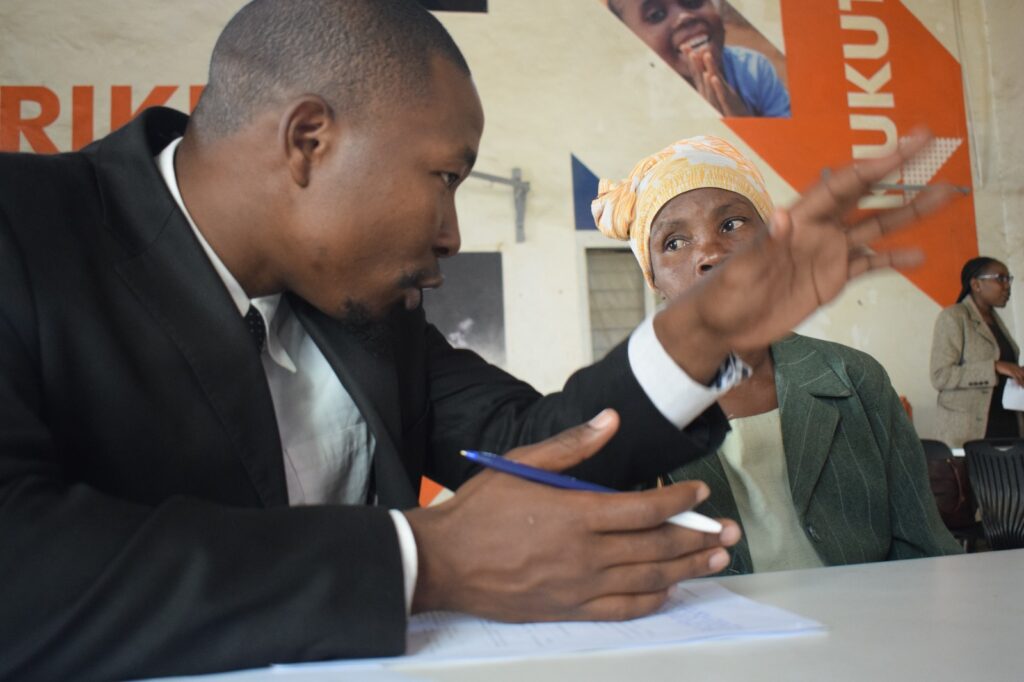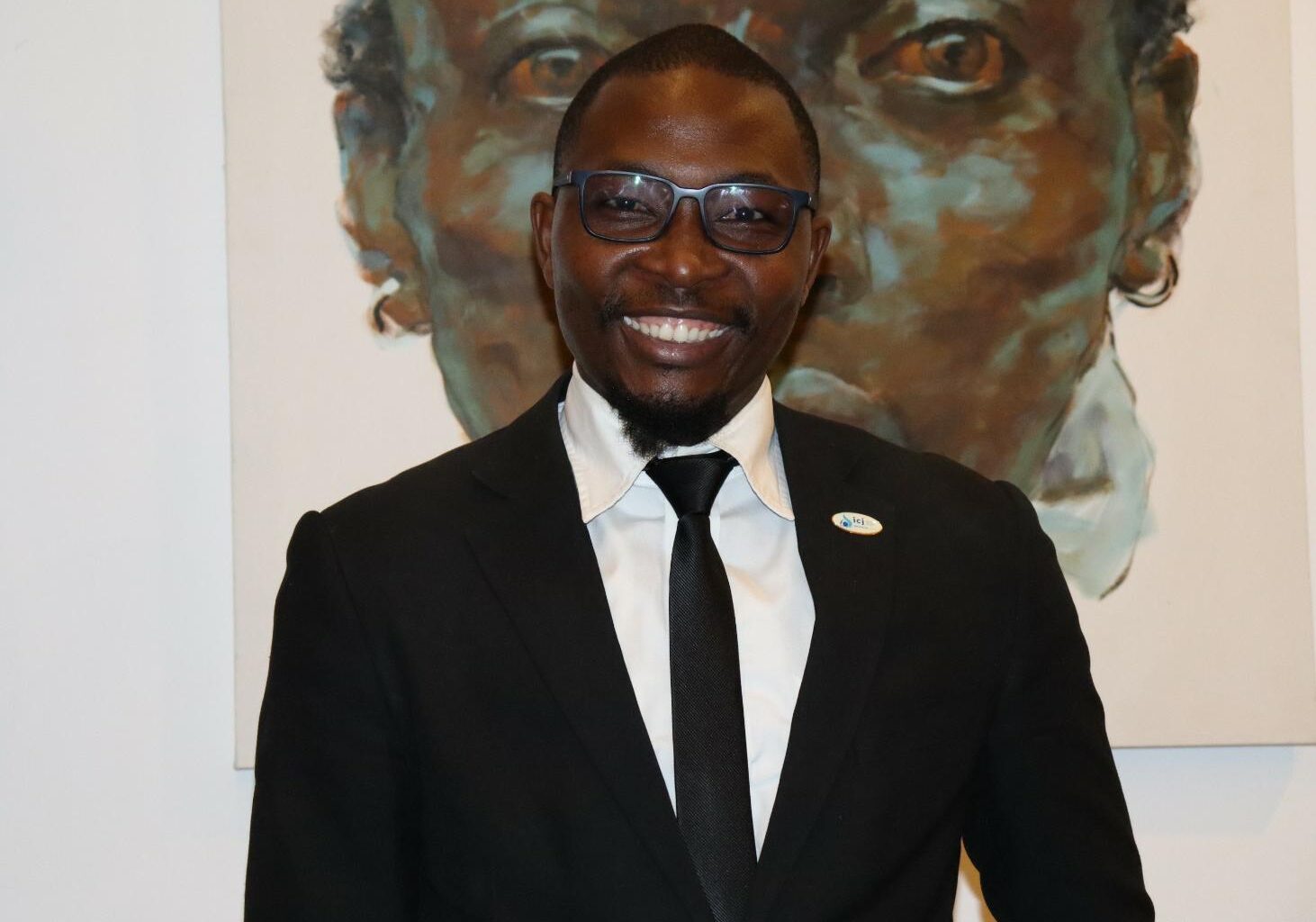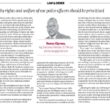By Shukri Wachu
NAIROBI,Kenya – In Nairobi’s Dandora neighbourhood,a cluster of humble structures defined by corrugated iron sheets adorn the roofs of hundreds of modest dwellings. Their reflective surfaces,amid the fierce beams of sunlight from the boundless sky,transform the iron sheets into animated canvases mirroring the shifting hues of daylight.
In the gritty alleyways of the slums growing up as a young lad, Geoffrey Odhiambo used the harsh embrace of life as an inspiration to create his own canvas, depicting a life he wanted, as he refused to succumb to the tyranny of his surroundings.
From a young age, it became abundantly clear that he wanted to pursue a path that would accord him and others around him a fair chance at life.
“I have had a passion for justice and a desire to advocate for others since I was young. Life in the ghettos of Dandora, where I grew up, was never easy. I was a ‘mtetezi’ against bullies and called out injustices,” said Odhiambo.
The monicker ‘mtetezi’ (defender) would stick with him throughout his formative years, as he would later decide to pursue a career in law and most importantly, as a human rights defender.
“My legal background has equipped me with the knowledge and skills to navigate our legal system, analyse legislation, and advocate for fairness and justice,”
As a programme officer at ICJ Kenya, Odhiambo has an impressive portfolio, championing for land, environment and climate justice as a research and public interest litigator.
In recent years however, its his work around economic justice and particularly, sensitizing the public on open contracting that has garnered him notable recognition.
Open contracting is the publication of government contracts. It includes information from the awarding process, to the monitoring and evaluation of contract implementation. It requires the pro-active disclosure of contract information with open access to the public.

“Well, open contracting aligns with human rights standards. You cannot talk about open contracting in isolation from human rights. Kenya has come a long way in implementing the Open Contracting Data Standards. But of course, there are still challenges in implementing open contracting. First, there is a lack of transparency culture. Even with robust legal and policy frameworks, government agencies are yet to be accustomed to the culture of transparency, making it challenging to implement open contracting effectively,” he said.
Odhiambo insists that every Kenyan has the right to know how government contracts are awarded and as such there is need to conduct public awareness in order to ensure those in power are accountable.
Through policy reforms, he has been able to champion for the strengthening of the Public Procurement Information Portal (PPIP) that aligns with open contracting data standards in numerous engagements with the Public Procurement Regulatory Authority.
“ I have trained community monitors, civil society organisations and journalists on open contracting. As a legal professional, my advocacy efforts have raised awareness through community forums and radio talk shows. It includes doing a podcast in ‘sheng’ on what open contracting is all about and how it can be used as a tool for transparency and accountability,” he explained.
With access to information challenges alive now more than ever, Odhiambo, has also been able to train monitors in community based organizations across several counties, mostly targeting those in slum areas.
Further through this, ICJ Kenya has been able to also track the work of community monitors especiallywhen sourcing for access to relevant data, including procurement details, expenditures, and contract information.
Makueni was the first county to have an open contracting data portal in 2018.
“The information obtained through the community monitoring efforts sheds light on procurement processes within public education and health entities. It also enabled us to identify challenges in open contracting and access to information such as corruption which leads to irregular bidding processes, favouring certain companies or individuals over others, thus compromising the principles of fair competition and transparency,’
Communities have also been able to track how contracts are paid especially when cases of inflation arise or payment is made for services not rendered. Recently there has been a renewed push to ensure that all facets of government invest in e-government solutions such as e-procurement systems and other technological solutions to automate and streamline the procurement process, reducing the opportunities for corrupt practices.
Not forgetting his roots, Odhiambo has regularly rendered free legal aid services in slum areas, recently training grassroots community monitors in Korogocho on how to seek information from government entities on open contracting and access to information and engaging with government entities and policy and legislative makers.
“I feel I have a duty to address systemic issues and contribute to creating a fair and transparent society.Seeing the transformative power of the law in protecting and empowering vulnerable individuals is a pivotal moment for me. It has solidified a deep passion for human rights advocacy within me,” noted Odhiambo.
Due to his relentless work,Odhiambo was this year appointed as member of the Steering Committee for the Assessment of the Right of Access to Information Implementation in Kenya by the Commission on Administrative Justice (CAJ).






